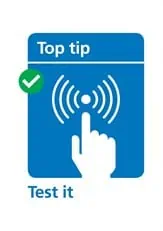This March, Royal Berkshire Fire and Rescue Service is asking residents to test their smoke alarms regularly and make it a part of their weekly routine, in support of the National Fire Chiefs Council’s month-long campaign. To remind yourself to test your smoke alarms weekly, why not join in with #TestItTuesday on our Twitter account?

Smoke alarms are important to your safety and they can give you those few extra seconds to escape in a fire. However, statistics show that smoke alarms alerted households to a fire in England in only 45% of cases, and the most common reason a smoke alarm failed to activate was because the fire was outside of its range. In light of this, we are also asking that residents ensure that they install at least one smoke alarm on every level of their home.
Despite the majority of homes (91%) having at least one working smoke alarm in their home, most people are not aware that their alarm needs replacing too.
Gail Muirhead, West Hub Prevention Manager, said: “Smoke alarms can offer vital protection for you and your loved ones, but most people simply fit and forget – they don’t know if it might be coming to the end of its lifespan or not working at all.
“For most of us, there is nothing more important than keeping our loved ones safe and secure. So, if your smoke alarm is getting past its best or your top floor is missing an alarm of its own, fit new ones, test them at least once a week and protect you and your loved ones.”
To keep you and your household safe, please read through and follow our advice:
- Make sure there is at least one smoke alarm on every level of your home.
- Test your smoke alarms by pushing the button every week.
- Check what type of alarms you have and change the batteries when appropriate (this could be every year or every 10 years).
- Fit smoke alarms in the right place – on landings and hallways and near bedrooms. Also consider fitting them in rooms which have electrical appliances – e.g. a heater or charger – or other fire risks.
- Take a moment to check on your loved ones who may need help to ensure they’re fully protected.
For more advice, visit the Smoke Alarms page on our website.